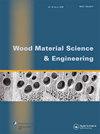热压和水热参数对再生木颗粒和刨花板的影响
IF 2.1
3区 农林科学
Q1 MATERIALS SCIENCE, PAPER & WOOD
引用次数: 0
摘要
摘要:本研究探讨了废旧刨花板再生颗粒的特性,以及降低再生板材物理力学性能的因素。对新鲜木材颗粒进行带/不带粘合剂热压和水热处理,研究了处理后颗粒的形貌、表面性能和机械强度。结果表明:热压导致颗粒致密化,导致润湿性降低,压实率降低,颗粒强度下降;因此,回收板的力学性能明显较弱。残余胶粘剂也影响胶粘剂的润湿性。水热处理有助于恢复回收颗粒的细胞结构和压实潜力,从而提高回收板的机械性能。颗粒质量的恶化主要是由于致密化和残留的胶粘剂,水热处理有助于恢复颗粒的结构,去除颗粒上的树脂。本文章由计算机程序翻译,如有差异,请以英文原文为准。
Effect of hot-pressing and hydrothermal parameters on recycled wood particles and particleboards
ABSTRACT This study investigates the characteristics of particles recycled from waste particleboards and the factors that lower the physical and mechanical properties of recycled panels. Hot-pressing with/without adhesive and hydrothermal treatment are applied to the fresh wood particles, and the morphology, surface properties, and mechanical strength of the particles after treatments are investigated. The results indicate that hot pressing causes the densification of particles, resulting in reduced wettability, a low compaction ratio, and a loss of particle strength; thus, the mechanical properties of recycled panels are significantly weak. The residual adhesive also affects the wetting of the adhesive. Hydrothermal treatment helps to recover the cellular structure and compaction potential of recycled particles, thus improving the mechanical properties of recycled panels. The deteriorations in particle qualities are mainly due to densification and residual adhesive, and hydrothermal treatment helps to recover the structure and remove the resin on the recycled particles.
求助全文
通过发布文献求助,成功后即可免费获取论文全文。
去求助
来源期刊

Wood Material Science & Engineering
Materials Science-General Materials Science
CiteScore
3.90
自引率
13.60%
发文量
131
审稿时长
79 days
期刊介绍:
Wood Material Science and Engineering is a multidisciplinary and international journal with the aim to serve at the forefront of the wood science and technology field. The journal publishes original articles on basic and applied research dealing with:
-Wood material science with emphasis on: water-wood relations, wood durability, wood modification, wood mechanics, wood composites, engineered wood products, energy conversion and eco-efficient wood based products.
-Wood engineering, i.e. the application of the wood material science to designing, processing and manufacturing of forest products and the use of machines and processes for these products. Products of concern are biofuels, sawn wood and further refined products such as structural elements, interior fittings and furnishings. In this aspect the link between the nature of the wood material and the properties of the final wood products in-service and its impact on the environment is of outmost importance.
High quality review papers may also be accepted but the topic should be discussed with the editor before submission.
 求助内容:
求助内容: 应助结果提醒方式:
应助结果提醒方式:


